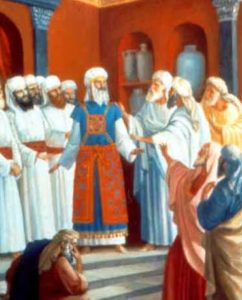At the end of last week’s article, we cited the Tanakh and a number of midrashim that speak of a “new covenant” or “new Torah” in the time to come, which is supposed to be brought by Mashiach. These sources may be quite shocking to read, especially when they speak of parts of the Torah we know and love essentially being annulled, and many of its laws no longer observed. These ideas might bring to mind Christianity and Islam, since the former believe in a “New Testament” that supplanted the “Old” one, while the latter see the Koran as a “Final Testament” that supplanted both the “New” and “Old”. As such, some have wondered: might Christians and Muslims actually have an argument?

No, they don’t.
Let’s start with Christianity: The first Christians were Jews who apparently followed a certain “rabbi” named Yehoshua, or Yeshu (or Jesus). We’ve already written in the past about the mythical origins of this Yehoshua, and how many details of his story were essentially plagiarized from the actual Biblical Yehoshua (Joshua). It isn’t too hard to imagine that the Jews who established Christianity were well-versed in the Tanakh, as well as various midrashic traditions. Of course, since they came to believe that Jesus was the messiah, they attributed to him what the Tanakh and other Jewish sources say about Mashiach, such as bringing a new covenant.
Yet, Jesus did not bring any new covenant at all. In fact, the New Testament itself records Jesus saying, “Do not think that I have come to abolish the Law or the Prophets; I have not come to abolish them but to fulfill them.” (Matthew 5:17) Jesus goes on to state that anyone who fails to keep even the tiniest of Jewish laws, or fails to be even stricter than the Pharisees (ie. Rabbinic Jews) will be “least in the kingdom of heaven.”
Keep in mind that the New Testament was not put together until at least a century after Jesus’ passing. The earliest gospel (Mark) was only composed some fifty years later. None of the gospel writers knew Jesus personally. In short, the New Testament has little to do with the historical Jesus and cannot be the new covenant of Mashiach.
More significantly, Jesus accomplished absolutely nothing that Mashiach is supposed to accomplish. He did not fulfil the ingathering of all the Jewish exiles, did not re-establish a Jewish kingdom in Israel, and did not bring peace to the world. Ironically, more people have been slaughtered in the name of Jesus than in the name of anything else. Not exactly what the Torah has in mind when it speaks of a messiah.
Islam is even easier to dispense with. Muhammad had no evident relationship to the Holy Land of Israel, the Jewish people, the Davidic dynasty, or any part of the Torah for that matter. Some scholars have argued that Islam should not even be considered an “Abrahamic” religion. The Koran itself describes Muhammad as an ummi, an “illiterate”. Muslims have traditionally interpreted this to mean that he was not literally illiterate, rather that he had no knowledge of previous holy books, particularly the Torah.
As for the Koran, like the New Testament it was not put together until long after Muhammad’s death. But that matters little, since the Koran doesn’t even claim to have been brought by a messiah. Muslims do not consider Muhammad a messiah! So, who was the messiah according to Islam? The Koran says that Jesus was! Muslims accept Jesus as al-Masih (Mashiach). In fact, Jesus is mentioned more than anyone else in the Koran (including Muhammad), a whopping 187 times! And as we’ve already seen, Jesus was certainly not the prophesized messiah.
The Rambam tells us how we can recognize the true messiah: a wise, righteous, and charismatic Jewish leader who brings the entire nation back to Israel, re-establishes there a holy kingdom at peace with its neighbours, and rebuilds the Temple in Jerusalem. Mashiach is the one who fulfills these tasks. Such a person may be worthy of transmitting a new covenant from God. Anyone else is only a pretender; either a false messiah or a failed one.
Chag sameach!


